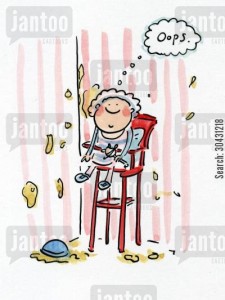Oops Plan
We all make mistakes. Mistakes are an important part of learning. When I was teaching older elementary students (10 and 11-year-olds) I would discuss with them the importance of learning from mistakes. I’m not sure exactly when and where I got hold of the “Oops Plan”, but it helped students learn different strategies for dealing with mistakes they made. I assume I got it from one of the school counselors or psychologists.
You can read the complete Oops plan here: http://www.hdhstory.net/school/oops.pdf
In short, here are the strategies (without the examples that were used to help define them.):
Oops Plan
Everybody everywhere makes mistakes. Often we don’t feel that good about it when we make mistakes and we try to do other things to cover up the fact that we just made a mistake. If you think this is happening to you, read through the following steps and see if you are using any of these strategies. Sometimes it can help you realize that the mistake wasn’t that bad. Each of these strategies have their own time and place, but they can get in the way of your mistakes. Mistakes are a great way to learn things.
- Denial – “No, I didn’t do it. It didn’t happen.”
- Ignore – “I know it happened, but I’m pretending like it didn’t.”
- Lie – “I know it happened, but I’m not telling you.”
- Blame – “I know it happened, but it’s your fault.”
- Guilt – “I know it happened, I did it, and I feel bad.”
- Remorse – “I know it happened. I did it. I feel bad. I want to do something about it.”
- Prevention – “I know it happened. I did it. I feel bad. I don’t want it to happen again.”
I would discuss the Oops Plan at the beginning of the year with my class. We might share examples that fit our own lives. We differentiated between making mistakes on a test and making mistakes on a decision. We talked about how certain strategies were better than others. The students each had a copy of the Oops plan glued into one of their notebooks. Whenever one of my students made a mistake in their actions, all I needed to say was “Oops, What are you going to do about it?” Or “Oops, what strategy do you think you should use?” The more I relied on the students to take control of their own behavior and actions, the more learning I believe was gained. That is not to say there weren’t times where I did take control and did tell them what I wanted them to do to resolve issues that they may have had due to mistakes that were made, or told them specifically what strategy that they were using, but for the most part I encouraged them to use the Oops Plan themselves and work towards a self-awareness that would help them throughout their lives.



This is great. I’m never with a class long enough to implement something like this, but it would be cool if some of the teachers I’ve subbed for would try it.
What a great way to help teach strategies for learning from mistakes.
Pingback: A to Z Blog Challenge 2016 – a Reflection | hdhstory.net